Module 1 My life Unit 2 daily life Reading 教学课件
文档属性
| 名称 | Module 1 My life Unit 2 daily life Reading 教学课件 | 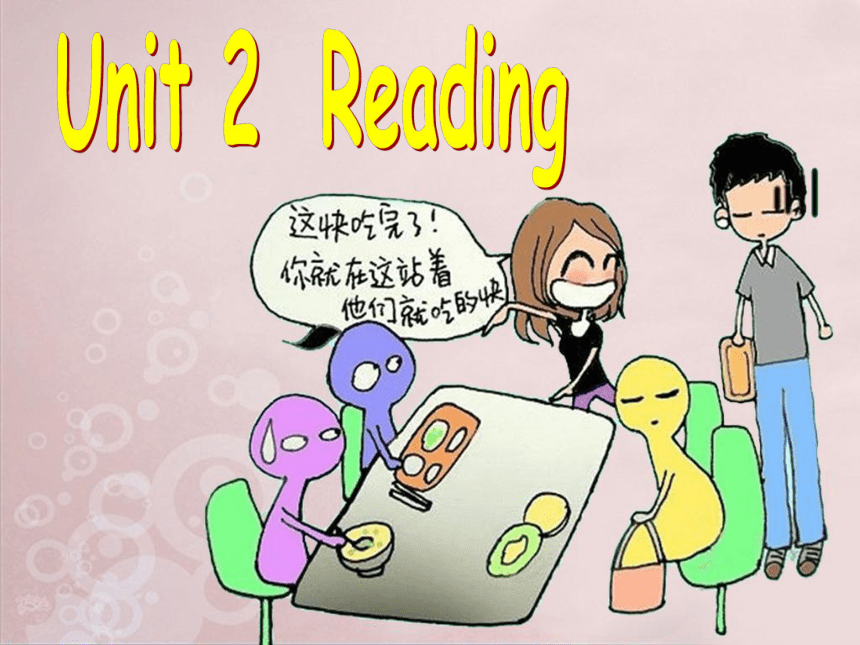 | |
| 格式 | zip | ||
| 文件大小 | 1.2MB | ||
| 资源类型 | 教案 | ||
| 版本资源 | 牛津深圳版 | ||
| 科目 | 英语 | ||
| 更新时间 | 2016-05-21 04:42:34 | ||
图片预览

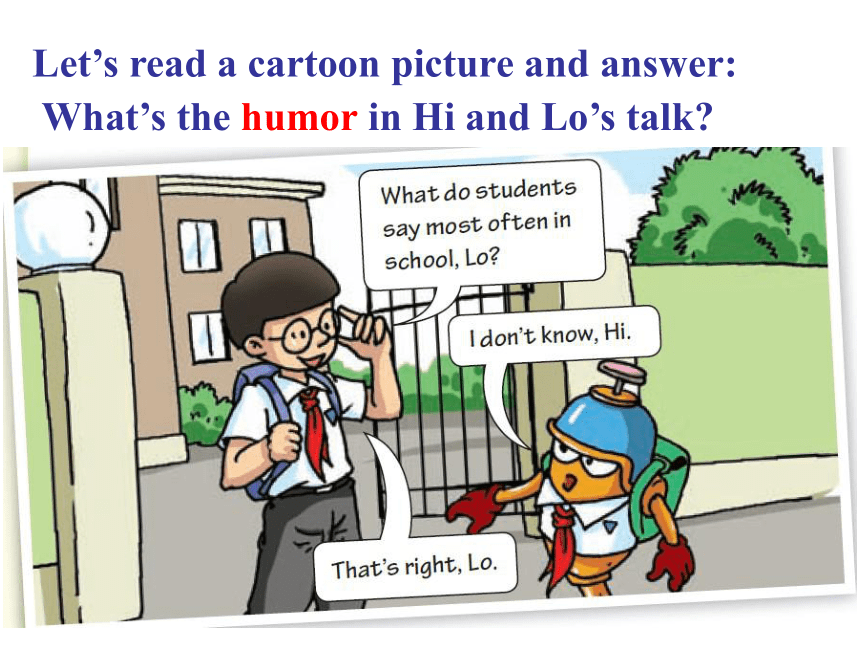
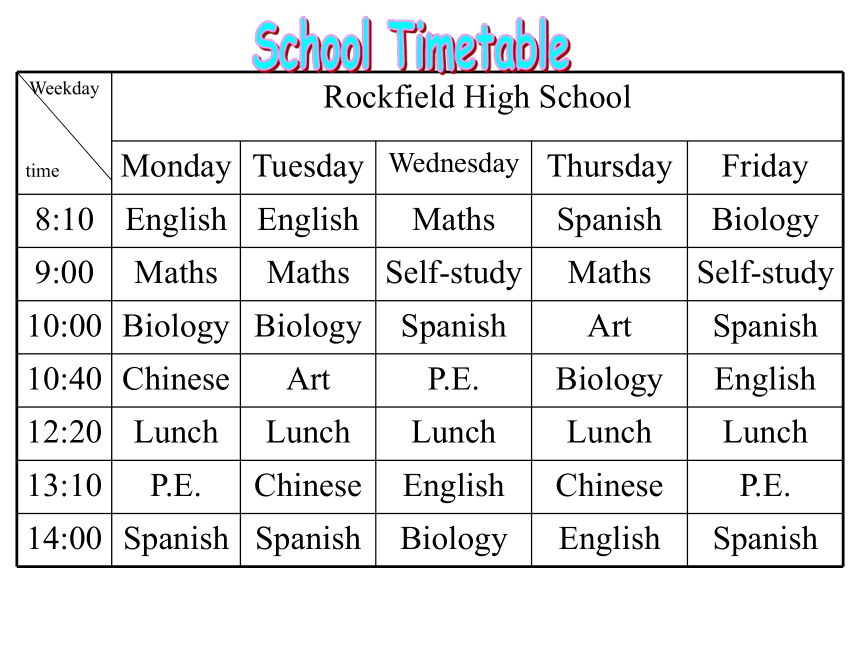
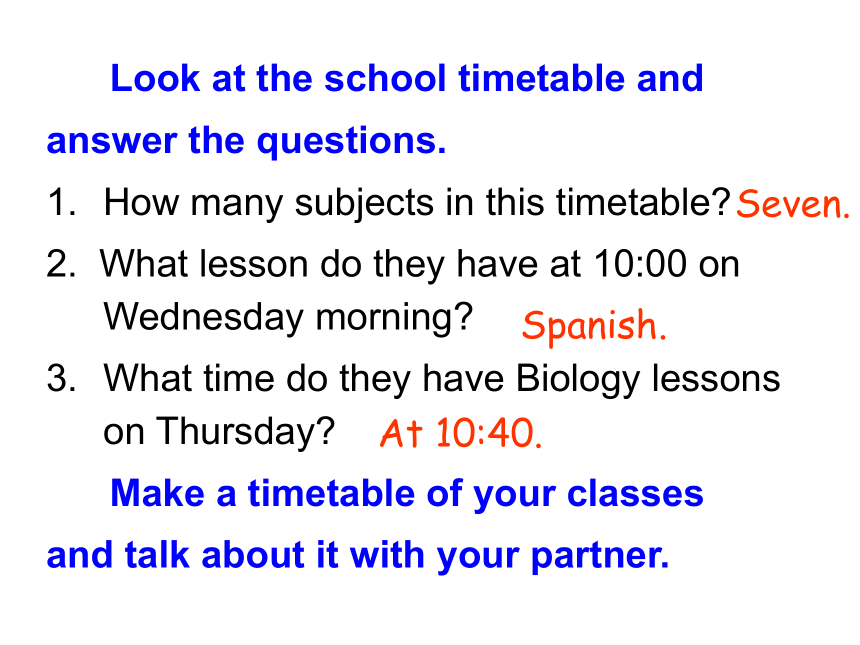
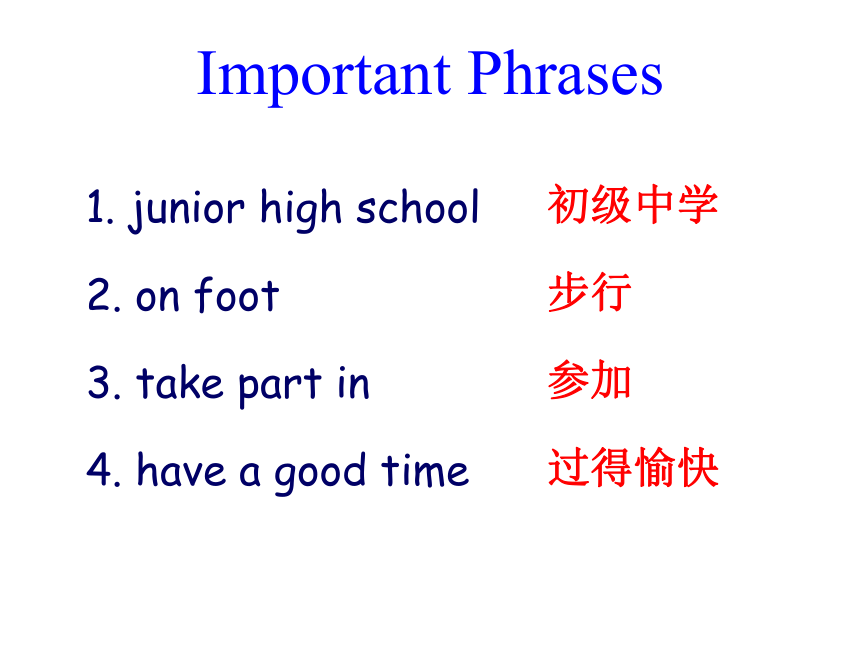
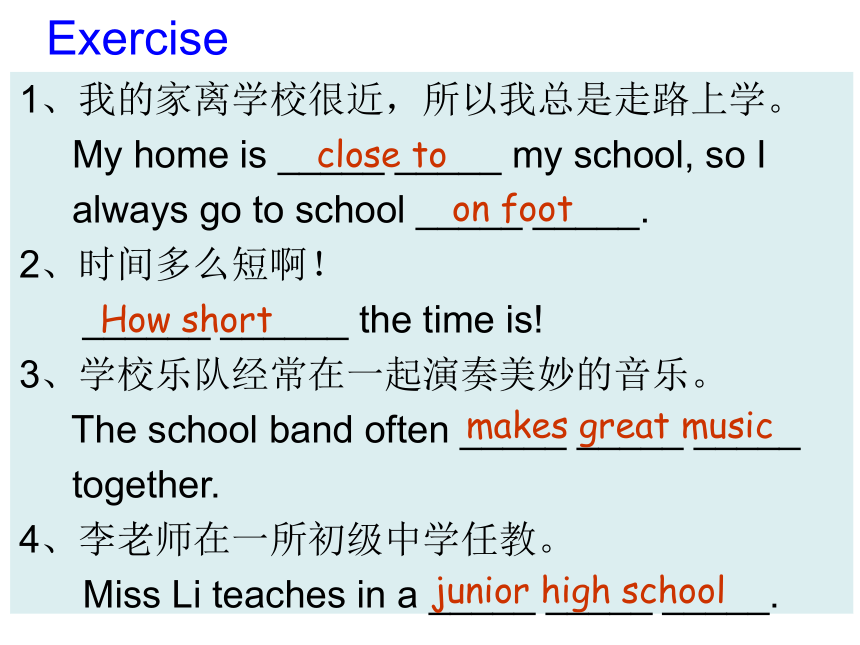
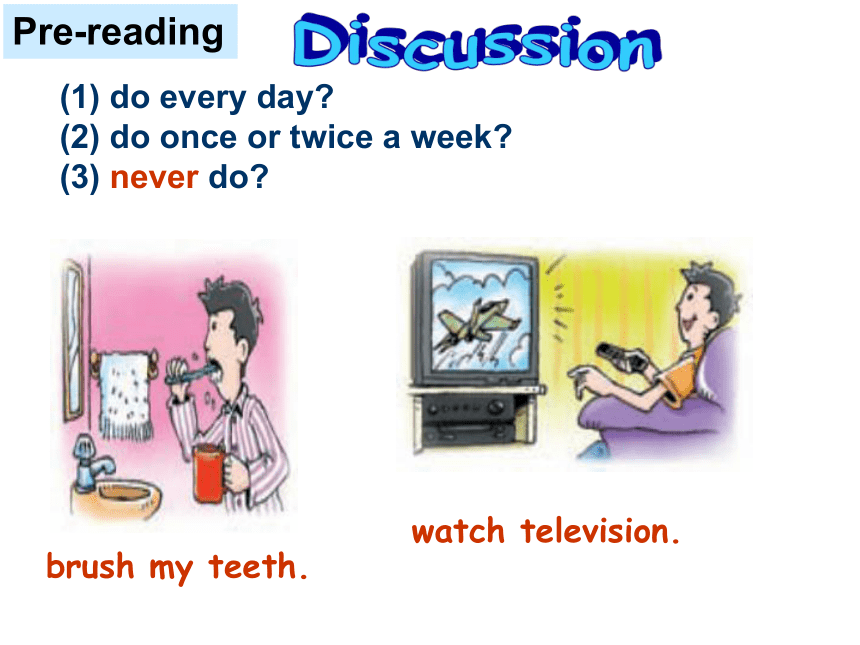
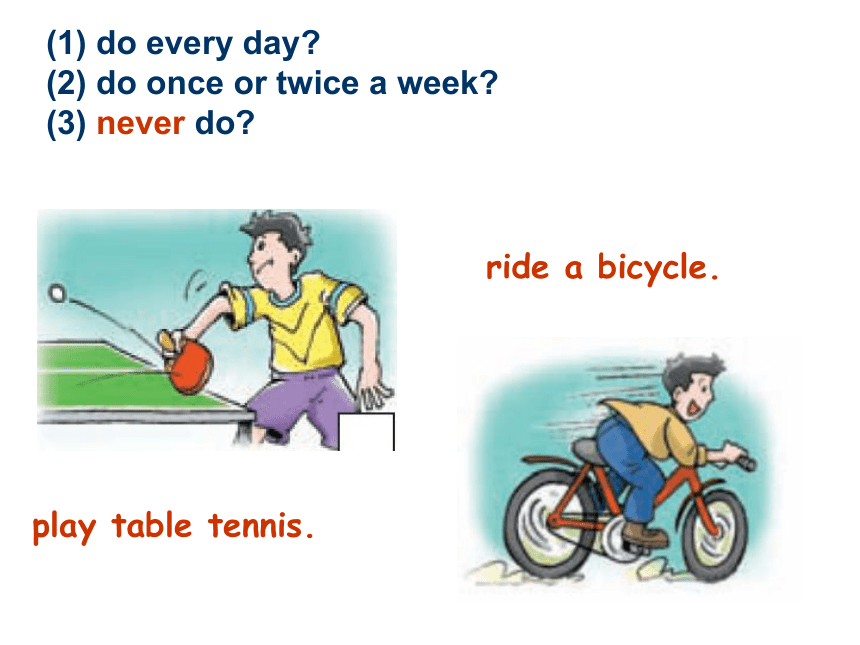
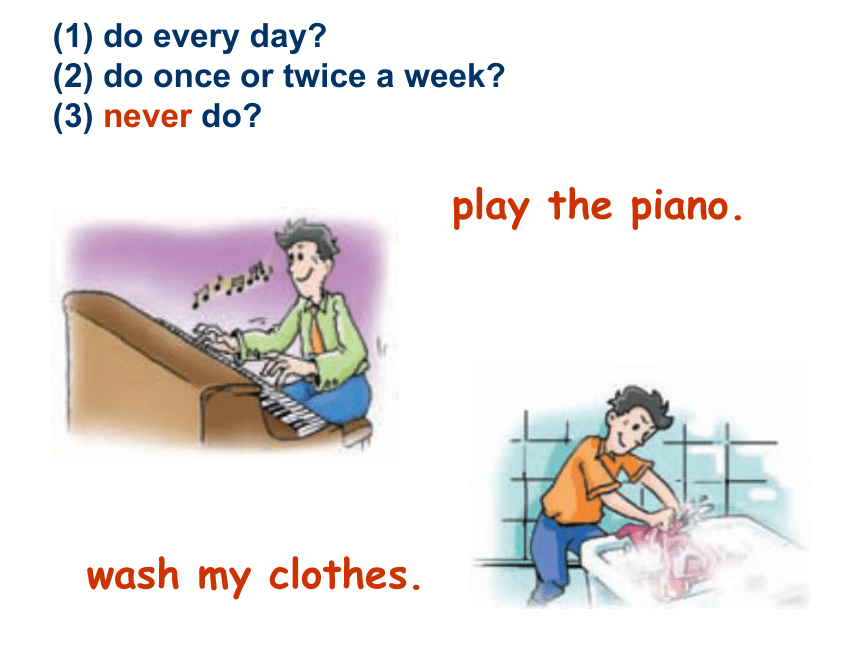
文档简介
课件26张PPT。Unit 2 ReadingLet’s read a cartoon picture and answer:
What’s the humor in Hi and Lo’s talk?
School Timetable Look at the school timetable and
answer the questions.
How many subjects in this timetable?
2. What lesson do they have at 10:00 on Wednesday morning?
What time do they have Biology lessons on Thursday?
Make a timetable of your classes
and talk about it with your partner.
Seven.Spanish.At 10:40.Important Phrases1. junior high school
2. on foot
3. take part in
4. have a good time初级中学
步行
参加
过得愉快Exercise1、我的家离学校很近,所以我总是走路上学。
My home is _____ _____ my school, so I
always go to school _____ _____.
2、时间多么短啊!
______ ______ the time is!
3、学校乐队经常在一起演奏美妙的音乐。
The school band often _____ _____ _____
together.
4、李老师在一所初级中学任教。
Miss Li teaches in a _____ _____ _____.on footclose toHow shortmakes great musicjunior high schoolPre-readingDiscussionbrush my teeth.watch television.(1) do every day?
(2) do once or twice a week?
(3) never do?play table tennis.(1) do every day?
(2) do once or twice a week?
(3) never do?ride a bicycle.play the piano.wash my clothes.(1) do every day?
(2) do once or twice a week?
(3) never do?Pre-readingB1 Look at the title of the article on page 17.
Then circle the correct answers.1. (Sam / Sam's friend) wrote this article.
2. It is about Sam's (school day/holiday).Pre-readingB2 Read the first sentence of each paragraph in the article on page 17.
Then answer the questions below.1. How does Sam go to school?
2. What subjects does Sam usually
study in the morning?
3. How long is the school
lunchtime?40 minutes long.Chinese, Maths and English.He goes to school on foot.While-ReadingC1 Do you know the meanings of the words according to the article on page 17?不常,很少休息发出钟声结束,终止在一起While-ReadingC2 Complete the conversation with the words and phrases from the box.break end on foot rings take part in usuallySam: Is your school close to your home,
Mandy?
Mandy: Yes, it is, so I go to school (1)_____.
Sam: Do you have a lunch (2)_________?
Mandy: Yes. We have one at 11:30 a.m.
Sam: When does the school day
usually (3)____?on footbreakendMandy: At 3:30 p.m. Most students go home
when the bell (4)________, but
some of us (5)_________ after-
school activities. I enjoy playing
basketball.
Sam: When do you (6)________ begin your
homework?
Mandy: At about 5:30 p.m.
usuallytake part inringsD1 Read the article on page 17 and circle the correct answers.1. Sam is a ______ school student.
A. primary B. junior high C. senior high
2. Sam's favourite subject is ______.
A. Maths B. Geography C. English
3. Sam often ______ during the morning break.
A. plays with his best friends
B. takes part in the school band
practice
C. reads booksWhile-ReadingB B A D2 Read the article again and answer the questions below in complete sentences.1. Why does Sam go to school on foot?
__________________________________
2. Why does Sam like Geography best?
__________________________________
3. Who are Sam's best friends?
__________________________________
4. What does Sam do after school?
___________________________ Because his school is close to his home.Because he enjoys learning about different places in the world.Tom and Jack are his best friends.He takes part in the school band
practice after school.While-ReadingD3 Fill in the table below and then compare your school day with Sam's. Follow the example.Post-ReadingLanguage points1.do once or twice a week? (P16)
每周做一次或两次?
once a week“每周一次”,twice a week “每周
两次”。 如:
他们每周去一次公园。
They go to the park once a week.
我每周有两个晚上去上美术课。
I go to art classes in the evening twice a week.
注:三次以上用基数词加次数time表示。如:
我每周看三次电视。
I watch TV three times a week. 2. I love going to school. 我喜欢上学。(P17)
love 意为“热爱,喜欢”,后面可以接动词的
?ing 形式和动词不定式, 构成句型love doing
sth (强调习惯性的动作) 或love to do sth(强调
某一次特定的动作) “喜欢做某事”。love 可与
like互换。如:
大多数孩子喜欢玩电脑游戏。
Most children love / like playing /
to play computer games.
3. My school is close to my home, so I
always go to school on foot. (P17)
我的学校靠近我家,所以我总是走路上学。
on foot “步行”,表示出行方式,在句子中
作状语。如:
你上学是乘公共汽车还是走路?
Do you go to school by bus or on foot?
路很远,我们不可能走路去。
It’s a long way there, we can’t go on
foot.4. I enjoy learning about different places
in the world. (P17)
我喜欢了解世界各地的风土人情。
(1)enjoy 意为“从……获得乐趣”,后面接名词或动词的?ing 形式,构成句型:enjoy sth “喜爱某物”和enjoy doing sth “喜爱做某事”,可与like互换。如:
我不喜欢那部电影。
I didn’t enjoy / like the film.
他夏天喜欢游泳。
He enjoys / likes swimming in summer.
(2) learn about“了解、知道”。如:
你想要了解什么情况?
What do you want to learn about?
我的老师要了解我的家庭生活。
My teacher wanted to learn about my
home life.Ⅰ.根据句意和所给的首字母填空。1. The students can have a b_____ between
two lessons.
2. When I was doing my homework at home yesterday afternoon, suddenly the door b_____ rang.
3. Starting to speak a foreign language takes lots of p_______.
4. It u__________ snows hard in winter in
Harbin because its temperature is
below 0℃ in winter.reak ellracticesuallyⅡ.单项选择。Most students in my class go to school
_____.
A. on feet B. on the foot
C. on foot D. by foot
2. — How often do you watch TV?
— ______.
A. At night
B. Twice time a week
C. Twice a week
D. Two time a weekCB 3. I love ______ storybooks in my free time.
A. read B. to reading
C. reading D. reads
4. There were not any buses then, ______ we
had to walk home.
A. because B. and
C. so D. but
5. The little boy doesn’t enjoy _____ to school.
A. go B. going
C. to go D. to going
CCBⅢ.根据中文意思,用完成下列英文句子。1. 我们班的新同学想了解我们的日常生活。
Our new classmate want to _____ _____
our daily lives.
2. 我希望你们玩得愉快。
I hope you will _____ _____ _____ _____.
3. 我们对有机会参加这个运动会感到很高兴。
We are very happy to have the chance to _____ _____ _____ the sports meeting.
4. 我想下周日到公园骑骑车。
I want to _____ _____ _____ in the
park next Sunday.learn abouthave a good timetake part inride a bicycle / bike
What’s the humor in Hi and Lo’s talk?
School Timetable Look at the school timetable and
answer the questions.
How many subjects in this timetable?
2. What lesson do they have at 10:00 on Wednesday morning?
What time do they have Biology lessons on Thursday?
Make a timetable of your classes
and talk about it with your partner.
Seven.Spanish.At 10:40.Important Phrases1. junior high school
2. on foot
3. take part in
4. have a good time初级中学
步行
参加
过得愉快Exercise1、我的家离学校很近,所以我总是走路上学。
My home is _____ _____ my school, so I
always go to school _____ _____.
2、时间多么短啊!
______ ______ the time is!
3、学校乐队经常在一起演奏美妙的音乐。
The school band often _____ _____ _____
together.
4、李老师在一所初级中学任教。
Miss Li teaches in a _____ _____ _____.on footclose toHow shortmakes great musicjunior high schoolPre-readingDiscussionbrush my teeth.watch television.(1) do every day?
(2) do once or twice a week?
(3) never do?play table tennis.(1) do every day?
(2) do once or twice a week?
(3) never do?ride a bicycle.play the piano.wash my clothes.(1) do every day?
(2) do once or twice a week?
(3) never do?Pre-readingB1 Look at the title of the article on page 17.
Then circle the correct answers.1. (Sam / Sam's friend) wrote this article.
2. It is about Sam's (school day/holiday).Pre-readingB2 Read the first sentence of each paragraph in the article on page 17.
Then answer the questions below.1. How does Sam go to school?
2. What subjects does Sam usually
study in the morning?
3. How long is the school
lunchtime?40 minutes long.Chinese, Maths and English.He goes to school on foot.While-ReadingC1 Do you know the meanings of the words according to the article on page 17?不常,很少休息发出钟声结束,终止在一起While-ReadingC2 Complete the conversation with the words and phrases from the box.break end on foot rings take part in usuallySam: Is your school close to your home,
Mandy?
Mandy: Yes, it is, so I go to school (1)_____.
Sam: Do you have a lunch (2)_________?
Mandy: Yes. We have one at 11:30 a.m.
Sam: When does the school day
usually (3)____?on footbreakendMandy: At 3:30 p.m. Most students go home
when the bell (4)________, but
some of us (5)_________ after-
school activities. I enjoy playing
basketball.
Sam: When do you (6)________ begin your
homework?
Mandy: At about 5:30 p.m.
usuallytake part inringsD1 Read the article on page 17 and circle the correct answers.1. Sam is a ______ school student.
A. primary B. junior high C. senior high
2. Sam's favourite subject is ______.
A. Maths B. Geography C. English
3. Sam often ______ during the morning break.
A. plays with his best friends
B. takes part in the school band
practice
C. reads booksWhile-ReadingB B A D2 Read the article again and answer the questions below in complete sentences.1. Why does Sam go to school on foot?
__________________________________
2. Why does Sam like Geography best?
__________________________________
3. Who are Sam's best friends?
__________________________________
4. What does Sam do after school?
___________________________ Because his school is close to his home.Because he enjoys learning about different places in the world.Tom and Jack are his best friends.He takes part in the school band
practice after school.While-ReadingD3 Fill in the table below and then compare your school day with Sam's. Follow the example.Post-ReadingLanguage points1.do once or twice a week? (P16)
每周做一次或两次?
once a week“每周一次”,twice a week “每周
两次”。 如:
他们每周去一次公园。
They go to the park once a week.
我每周有两个晚上去上美术课。
I go to art classes in the evening twice a week.
注:三次以上用基数词加次数time表示。如:
我每周看三次电视。
I watch TV three times a week. 2. I love going to school. 我喜欢上学。(P17)
love 意为“热爱,喜欢”,后面可以接动词的
?ing 形式和动词不定式, 构成句型love doing
sth (强调习惯性的动作) 或love to do sth(强调
某一次特定的动作) “喜欢做某事”。love 可与
like互换。如:
大多数孩子喜欢玩电脑游戏。
Most children love / like playing /
to play computer games.
3. My school is close to my home, so I
always go to school on foot. (P17)
我的学校靠近我家,所以我总是走路上学。
on foot “步行”,表示出行方式,在句子中
作状语。如:
你上学是乘公共汽车还是走路?
Do you go to school by bus or on foot?
路很远,我们不可能走路去。
It’s a long way there, we can’t go on
foot.4. I enjoy learning about different places
in the world. (P17)
我喜欢了解世界各地的风土人情。
(1)enjoy 意为“从……获得乐趣”,后面接名词或动词的?ing 形式,构成句型:enjoy sth “喜爱某物”和enjoy doing sth “喜爱做某事”,可与like互换。如:
我不喜欢那部电影。
I didn’t enjoy / like the film.
他夏天喜欢游泳。
He enjoys / likes swimming in summer.
(2) learn about“了解、知道”。如:
你想要了解什么情况?
What do you want to learn about?
我的老师要了解我的家庭生活。
My teacher wanted to learn about my
home life.Ⅰ.根据句意和所给的首字母填空。1. The students can have a b_____ between
two lessons.
2. When I was doing my homework at home yesterday afternoon, suddenly the door b_____ rang.
3. Starting to speak a foreign language takes lots of p_______.
4. It u__________ snows hard in winter in
Harbin because its temperature is
below 0℃ in winter.reak ellracticesuallyⅡ.单项选择。Most students in my class go to school
_____.
A. on feet B. on the foot
C. on foot D. by foot
2. — How often do you watch TV?
— ______.
A. At night
B. Twice time a week
C. Twice a week
D. Two time a weekCB 3. I love ______ storybooks in my free time.
A. read B. to reading
C. reading D. reads
4. There were not any buses then, ______ we
had to walk home.
A. because B. and
C. so D. but
5. The little boy doesn’t enjoy _____ to school.
A. go B. going
C. to go D. to going
CCBⅢ.根据中文意思,用完成下列英文句子。1. 我们班的新同学想了解我们的日常生活。
Our new classmate want to _____ _____
our daily lives.
2. 我希望你们玩得愉快。
I hope you will _____ _____ _____ _____.
3. 我们对有机会参加这个运动会感到很高兴。
We are very happy to have the chance to _____ _____ _____ the sports meeting.
4. 我想下周日到公园骑骑车。
I want to _____ _____ _____ in the
park next Sunday.learn abouthave a good timetake part inride a bicycle / bike
